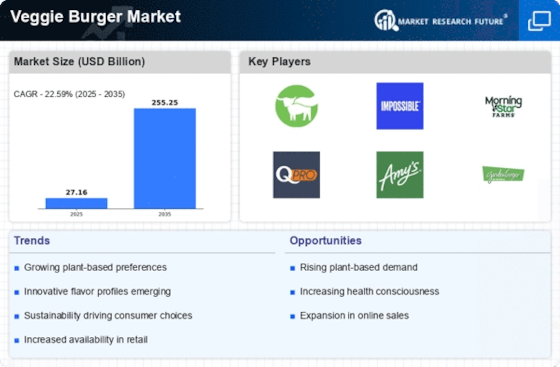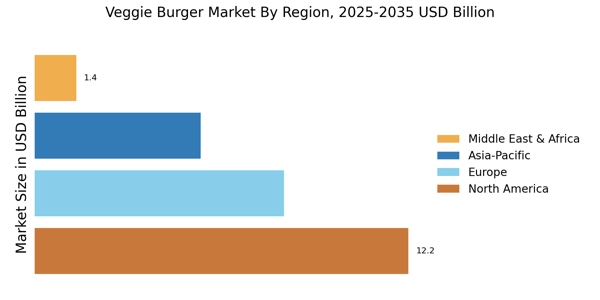Health Consciousness
The increasing awareness of health and wellness among consumers appears to be a primary driver for the Veggie Burger Market. As individuals become more informed about the nutritional benefits of plant-based diets, the demand for veggie burgers has surged. Research indicates that a significant portion of the population is actively seeking alternatives to traditional meat products, which are often associated with health risks. In fact, studies show that nearly 30% of consumers are reducing their meat intake, thereby propelling the growth of the veggie burger segment. This trend is further supported by the rise in vegetarian and vegan lifestyles, which are gaining traction across various demographics. Consequently, the Veggie Burger Market is likely to experience sustained growth as more consumers prioritize health-conscious choices in their diets.
Sustainability Focus
The growing emphasis on sustainability and environmental responsibility is a notable driver for the Veggie Burger Market. As climate change concerns escalate, consumers are increasingly inclined to choose products that align with their values regarding environmental stewardship. The production of veggie burgers typically requires fewer resources and generates lower greenhouse gas emissions compared to traditional meat production. Data suggests that plant-based diets can reduce an individual's carbon footprint significantly, which resonates with eco-conscious consumers. This shift towards sustainable eating habits is not merely a trend but appears to be a fundamental change in consumer behavior. As a result, the Veggie Burger Market is poised to benefit from this heightened focus on sustainability, attracting a broader audience that prioritizes ethical consumption.
Technological Advancements
Technological innovations in food production and processing are transforming the Veggie Burger Market. Advances in food technology have enabled manufacturers to create veggie burgers that closely mimic the taste and texture of traditional meat products. This has broadened the appeal of veggie burgers to a wider audience, including flexitarians and meat-lovers who may have previously been hesitant to try plant-based options. Moreover, the development of new ingredients and formulations has enhanced the nutritional profile of veggie burgers, making them more attractive to health-conscious consumers. Market data indicates that the introduction of innovative products has led to a notable increase in sales within the veggie burger segment. As technology continues to evolve, the Veggie Burger Market is likely to see further growth driven by these advancements.
Diverse Consumer Preferences
The Veggie Burger Market is significantly influenced by the diverse preferences of consumers. As culinary tastes evolve, there is a growing demand for a variety of flavors and ingredients in veggie burgers. This trend is particularly evident among younger consumers, who are more adventurous in their food choices and seek unique dining experiences. Manufacturers are responding by introducing an array of veggie burger options that cater to different palates, including ethnic flavors and gourmet ingredients. Additionally, the rise of social media has amplified the visibility of innovative veggie burger offerings, encouraging consumers to explore new products. This diversification in consumer preferences is likely to drive competition within the Veggie Burger Market, prompting brands to continuously innovate and expand their product lines.
Convenience and Accessibility
The increasing demand for convenience in food options is a significant driver for the Veggie Burger Market. As lifestyles become busier, consumers are seeking quick and easy meal solutions that do not compromise on health or taste. Veggie burgers, often available in ready-to-cook or pre-cooked formats, provide a convenient alternative to traditional meat products. Market Research Future indicates that the availability of veggie burgers in supermarkets, restaurants, and fast-food chains has expanded, making them more accessible to a wider audience. This trend is particularly appealing to busy families and working professionals who prioritize efficiency in meal preparation. As convenience continues to be a key factor in consumer decision-making, the Veggie Burger Market is likely to thrive, catering to the needs of a time-strapped population.

















